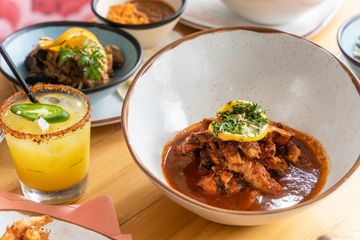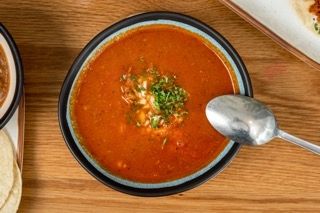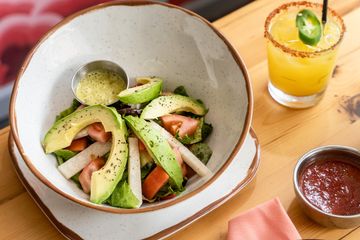Is Mexican Food Healthy? Unpacking the Nutritional Benefits of Conventional Active Ingredients
The concern of whether Mexican food is healthy and balanced welcomes an expedition of its typical active ingredients. Beans and corn offer as foundational staples, abundant in protein and fiber. Avocados give advantageous fats, while different natural herbs and spices include flavor and wellness advantages - mexican food. Together, these elements develop a tapestry of nutrition. However, the healthiness of Mexican food commonly relies on preparation approaches and section sizes. What duty do these variables play in identifying its total dietary worth?
The Power of Beans: Healthy Protein and Fiber-Rich Staples
Although commonly neglected, beans offer as a keystone of Mexican food, supplying a wide range of dietary advantages. Rich in protein, they are an outstanding plant-based option for those looking for to fulfill their dietary protein needs. This high healthy protein content supports muscular tissue repair service and growth, making beans invaluable for both meat-eaters and vegetarians alike. Additionally, beans are an outstanding source of dietary fiber, which helps in digestion and advertises a feeling of fullness, possibly aiding with weight monitoring.
The range of beans used in Mexican recipes, such as black beans, pinto beans, and kidney beans, adds to a diverse flavor profile and can improve dishes nutritionally. Beans are reduced in fat and have essential vitamins and minerals, including magnesium, iron, and folate. Together, these features make beans a critical ingredient, supplying both sustenance and food in conventional Mexican fare.

Corn: a Versatile Grain With Nutritional Conveniences
Corn sticks out as a flexible grain essential to Mexican food, commemorated not just for its culinary applications however also for its remarkable nutritional profile. As a primary active ingredient in dishes like tortillas, tamales, and pozole, corn provides crucial nutrients that add to a well balanced diet plan. Rich in carbs, it functions as a considerable power source, while additionally being reduced in fat, making it a favorable option for different nutritional needs.
Corn is an excellent source of nutritional fiber, which helps in digestion and advertises satiation. It has substantial quantities of vitamins such as B-complex vitamins, which are important for basal metabolism. The existence of antioxidants, particularly carotenoids, contributes to total wellness by lowering oxidative stress and anxiety. In addition, corn is gluten-free, accommodating those with gluten sensitivities. In general, the nutritional advantages of corn highlight its significance in standard Mexican food and its function in a healthy diet regimen.
Avocados: Healthy Fats and Nutrients in Every Bite
Avocados play a significant duty in Mexican cuisine, complementing recipes with their velvety structure and abundant flavor. Past their cooking appeal, avocados are celebrated for their impressive dietary account. They are an abundant resource of healthy and balanced monounsaturated fats, which can aid reduced poor cholesterol levels and assistance heart wellness. In addition, avocados are loaded with necessary minerals and vitamins, consisting of potassium, vitamin E, and B vitamins, adding to general wellness.
The high fiber web content in avocados help digestion and advertises satiety, making them a valuable addition to any type of dish. Their one-of-a-kind nutrient make-up can additionally sustain skin health and wellness and provide anti-inflammatory benefits. Incorporating avocados into typical Mexican dishes or appreciating them as a standalone snack can boost both taste and nourishment, demonstrating why they are a precious staple in Mexican food. On the whole, avocados use a scrumptious way to appreciate healthy fats and important nutrients in every bite.

Flavors and Herbs: Flavorful Health Boosters
While taking pleasure in the abundant tastes of Mexican cuisine, one can not overlook the essential duty that spices and natural herbs play in improving both preference and health. Active ingredients such as oregano, cilantro, and chili peppers not only add to the vibrant flavor profile but likewise provide substantial wellness benefits. For example, cilantro is understood for its detoxing homes, assisting to eliminate hefty steels from the body, while oregano is loaded with anti-oxidants and has anti-inflammatory results.
Chili peppers, a staple in lots of Mexican dishes, contain capsaicin, which has been linked to improved metabolism and discomfort alleviation. Furthermore, flavors like cumin and coriander support food digestion and may assist in blood sugar level regulation. Integrating these delicious wellness boosters into meals not only improves the cooking experience yet also promotes general wellness, making Mexican cuisine not just scrumptious, but also nutritionally advantageous.
Traditional Food Preparation Methods: Enhancing Nourishment and Taste
Standard cooking techniques in Mexican food play a vital role in improving both nutrition and flavor, as they typically prioritize time-honored methods and fresh ingredients. Techniques such as nixtamalization, where corn is soaked and cooked in an alkaline remedy, not just improve the nutrient account of tortillas however useful content also improve their digestibility - freshly made guacamole. In addition, making use of slow food preparation methods, like stewing or braising, enables flavors to combine perfectly while preserving the honesty of the ingredients

Often Asked Concerns
Are Mexican Food Portions Generally Larger Than Various Other Cuisines?
Mexican food parts are typically bigger than those of several other foods. This characteristic shows typical eating techniques, highlighting public sharing and hearty meals, which can cause an extra significant serving size on the whole.
How Does the Preparation Method Affect Healthiness of Mexican Food?
Preparation methods substantially influence the healthiness of Mexican food. Techniques such as barbecuing or steaming protect nutrients, while frying can increase harmful fat content. Choices of components and cooking designs ultimately figure out general nutritional value.
Can Mexican Food Be Tailored for Particular Dietary Constraints?
Mexican food can without a doubt be tailored for particular nutritional restrictions. Alternatives, such as utilizing corn tortillas for gluten-free diet regimens or including more vegetables, enable people to enjoy traditional flavors while fitting various dietary demands.
What Are Common Mistaken Beliefs About Mexican Food and Wellness?
Common mistaken beliefs regarding Mexican food include the belief that it is inherently unhealthy, overly zesty, and exclusively concentrated on fats. Actually, standard meals commonly feature nourishing active ingredients and can be tailored to different dietary demands.
Exist Healthier Choices at Mexican Restaurants?
Healthier choices at Mexican dining establishments typically include grilled meats, beans, and fresh veggies. Picking dishes that highlight whole components and preventing hefty sauces can cause an extra nourishing dining experience, promoting overall health.
The range of beans utilized in Mexican meals, such as black beans, pinto beans, and kidney beans, contributes to a diverse flavor account and can boost meals nutritionally. Avocados play a significant function in Mexican cuisine, matching meals with their luscious texture and rich flavor. Incorporating avocados into typical Mexican dishes or enjoying them hop over to these guys as a this link standalone snack can boost both taste and nutrition, demonstrating why they are a beloved staple in Mexican cuisine. While delighting in the rich tastes of Mexican cuisine, one can not neglect the vital role that spices and herbs play in improving both taste and health. Traditional food preparation methods in Mexican food play an essential role in enhancing both nourishment and flavor, as they frequently prioritize fresh ingredients and time-honored strategies.